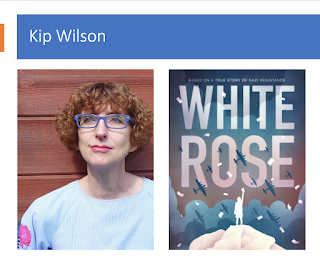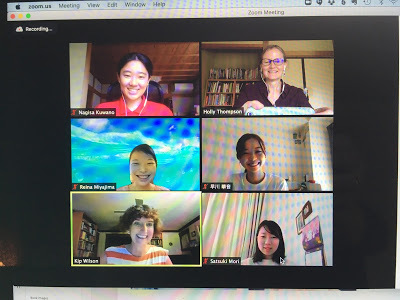A Packed Week of American Lit
This week I taught my second Yokohama City University intensive course in two weeks. I usually teach American Literature/Literature in English over the course of fifteen weeks, five weeks of which is dedicated to literature circles for novels. This year, the course is offered as an intensive, so I revised the syllabus drastically to fit the one-week time frame and the remote delivery.
We focused on contemporary literature and read short stories by Sandra Cisneros, Arriel Vinson and Celeste Ng. We discussed the verse novel form and read a verse short story by Kip Wilson. We read an essay by Ona Gritz and narrative poems by Margarita Engle, Gary Soto, Naomi Shihab Nye, William Stafford, Li-Young Lee and Jacqueline Woodson. Students wrote reflections on the readings and a final report including analysis of additional stories, poems and essays.
Despite the time difference between Japan and Boston, we were so pleased to receive a Zoom visit from author Kip Wilson (author of the YA verse novel White Rose about anti-Nazi political activist Sophie Scholl). The students had read her verse story Car 393 about the Boston trolley accident of 1916, and we'd sent questions to Kip in advance. Thanks to Zoom, like magic she popped into our classroom Friday morning.
 How fortunate to have Kip chat with us and share the inspiration for crafting this Boston-set historical fiction story. She explained the research she conducted; her selection process for determining which particular individuals on the doomed trolley to feature as characters; her reasons for structuring the story in three parts with four voices; and her hopes that she has honored the individuals by painting them in a positive light via glimpses of their imagined hopes and dreams before the trolley plunged into the channel and a cold November rising tide.
How fortunate to have Kip chat with us and share the inspiration for crafting this Boston-set historical fiction story. She explained the research she conducted; her selection process for determining which particular individuals on the doomed trolley to feature as characters; her reasons for structuring the story in three parts with four voices; and her hopes that she has honored the individuals by painting them in a positive light via glimpses of their imagined hopes and dreams before the trolley plunged into the channel and a cold November rising tide.
Intensives offer students the opportunity to take a deep dive into a topic over a period of a week. The advantage is sustained focus from class to class. The downside is little or no time between each class for reading.
Several of my students joined both my Japanese Literature in English course and this American Literature course, for back-to-back deep dives. One of those students reflected that she hasn't read many books since starting university, but with these courses, she'd read stories and excerpts from various books--it was a good opportunity. Then she confessed to the class, "I'm afraid of reading books in English." And my breath caught when everyone nodded in agreement.
So we talked about the importance of finding books that interest you and feel right for your reading level, and the fact that tackling books above your level makes reading into a translation exercise. I pointed them toward middle grade and young adult novels, many of which are a perfect fit for Japanese university students.
So while I've loved these intensives, and the opportunities that the remote delivery opened up, maybe next year the course will be offered as a full semester course once again, and I can return to including novels and literature circles. How gratifying it always is to hear students say proudly, "This is the first novel I have read in English."



